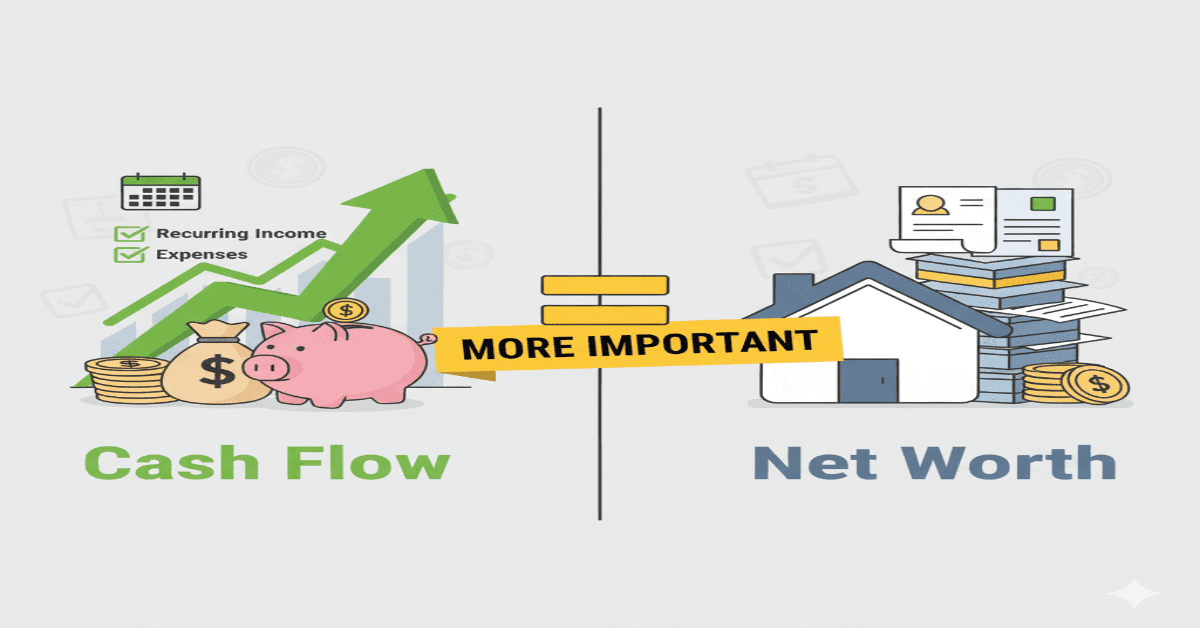Why Cash Flow Is More Important Than Net Worth?
Why Cash Flow Is More Important Than Net Worth?
For decades, conversations about wealth revolved around net worth — the total value of a person’s assets minus their liabilities. People bragged about the size of their investment portfolios, the market value of their real estate, or the worth of their businesses. But in today’s economy, especially in the post-pandemic financial landscape of 2025, cash flow has emerged as the real measure of financial health and freedom.
From small business owners in Main Street America to young professionals navigating inflation and student loan debt, more people are realizing that liquidity — the money coming in regularly — matters far more than the number you see on paper in a net worth statement.
HSBC Cashback Credit Card 2025 – Benefits, Rewards & How to Apply?

Understanding Net Worth vs. Cash Flow
What is the definition of net worth?
Net worth is calculated as:
Net Worth = Total Assets – Total Liabilities
Assets can include:
- Real estate
- Stocks, bonds, retirement accounts
- Business ownership stakes
- Vehicles, valuables, and savings
Liabilities include:
- Mortgages
- Student loans
- Credit card debt
- Business loans
While net worth provides a snapshot of your financial position, it doesn’t necessarily reflect your financial stability in day-to-day life.
Cash flow: what is it?
Cash flow refers to the movement of money in and out of your accounts — your income versus your expenses. It is essential to both personal and corporate finance.
Positive cash flow means you have more money coming in than going out. Negative cash flow means your expenses are eating away at your reserves.
Cash flow sources can include:
- Salary or wages
- Business revenue
- Rental income
- Dividends or investment payouts
- Side hustles and freelancing
Unlike net worth, cash flow determines whether you can pay your bills, handle emergencies, and invest for the future without stress.
Why Cash Flow Matters More in 2025
Liquidity Beats Paper Wealth
Having a high net worth is meaningless if your wealth is locked up in assets you cannot quickly convert to cash. For example:
- A homeowner may have a $1 million house but struggle to pay monthly bills.
- An entrepreneur may have equity in a business but no immediate funds to cover payroll.
Liquidity = Survival. Cash flow ensures you can pay your mortgage, cover healthcare, and invest in opportunities without waiting months or years to unlock asset value.
Inflation and Cost of Living Pressures
In 2025, inflation continues to reshape household budgets. Even individuals with “healthy” net worth are struggling because cash flow doesn’t keep up with rising expenses.
Example:
A retiree with $500,000 in retirement savings may look wealthy on paper, but if they only withdraw $2,000 a month while inflation drives up living costs to $3,000, they are financially strained.
Cash flow ensures adaptability in an economy where prices can shift rapidly.
Cash Flow Provides Financial Freedom
Being financially independent means having steady sources of income that allow you to live well without worrying about money all the time.
A person who has $5,000 in cash flow (passive income) every month is frequently in a better position than someone who has a net worth of $2 million but no steady source of income.
Credit Health and Debt Management
A healthy cash flow facilitates:
- Reduce debt more quickly.
- Avoid relying too much on high-interest credit cards.
- Continue to have high credit ratings.
Poor cash flow can result in missed payments, defaults, and financial stress even if you have a healthy net worth.
Possibilities Need Cash on Hand
Opportunities in stocks, real estate, or commercial endeavors typically call for easily accessible funds. Someone with strong cash flow can seize opportunities, while someone with a high net worth but low liquidity may miss out.
The Psychology of Net Worth vs. Cash Flow
- Because you know your income can pay your expenses, cash flow helps you feel less anxious about money.
- An fixation with net worth frequently results in paper-chasing without enhancing day-to-day living.
- Cash flow provides confidence, enabling smarter investments and lifestyle decisions.
Business Perspective: Why Companies Focus on Cash Flow
Businesses live and die by cash flow. Even profitable companies can fail if they don’t manage liquidity. In fact, 82% of small businesses fail because of poor cash flow management (U.S. Bank Study).
Key points:
- Revenue doesn’t equal cash flow.
- Profits mean nothing if expenses and receivables are misaligned.
- Strong cash flow ensures payroll, growth, and resilience during downturns.
How to Make Cash Flow Better
Spread Out Your Sources of Income
- Freelance side ventures
- Rental homes
- Passive investments and dividends
Manage Costs
- Reduce pointless subscriptions
- Cut back on high-interest debt
- Don’t overspend.
Invest in Assets That Generate Cash
- Real estate rentals
- Dividend-paying stocks
- Online businesses
Create Emergency Funds
Cash flow stability amid unforeseen disruptions is ensured by an emergency fund that covers six to twelve months’ worth of expenses.
Track and Automate Finances
Track cash inflows, keep an eye on expenditures, and spot leakage with apps and tools.
The Reasons Why Net Worth Is Still Important, But Less
Net worth isn’t worthless, to be clear. It displays long-term financial planning and wealth accumulation. A net worth devoid of cash flow, however, is like having a car without gas; it may seem fantastic, but it won’t get you anywhere.
Expert Views for 2025
Cash flow-focused planning is being emphasized more and more by financial advisors:
- CFPs advise their customers to put income-generating assets ahead of passive asset accumulation.
- Economists observe that stable cash flow protects households from financial shocks in erratic markets.
- Retirement advisers emphasize that retirees want more than simply sizable investments; they also need steady sources of income.
Conclusion: The Transition to Cash Flow Theory
Cash flow is crucial in the modern economy. Although net worth is a measure of long-term financial progress, it is not a guarantee of peace of mind or the ability to pay bills.
Focus on creating and safeguarding steady income flow whether you are a young professional, small business owner, or retirement planner. That’s the true measure of financial success in 2025 and beyond.
The Link Between Happiness and Spending: How Money Shapes Well-Being
The Link Between Happiness and Spending: How Money Shapes Well-Being
